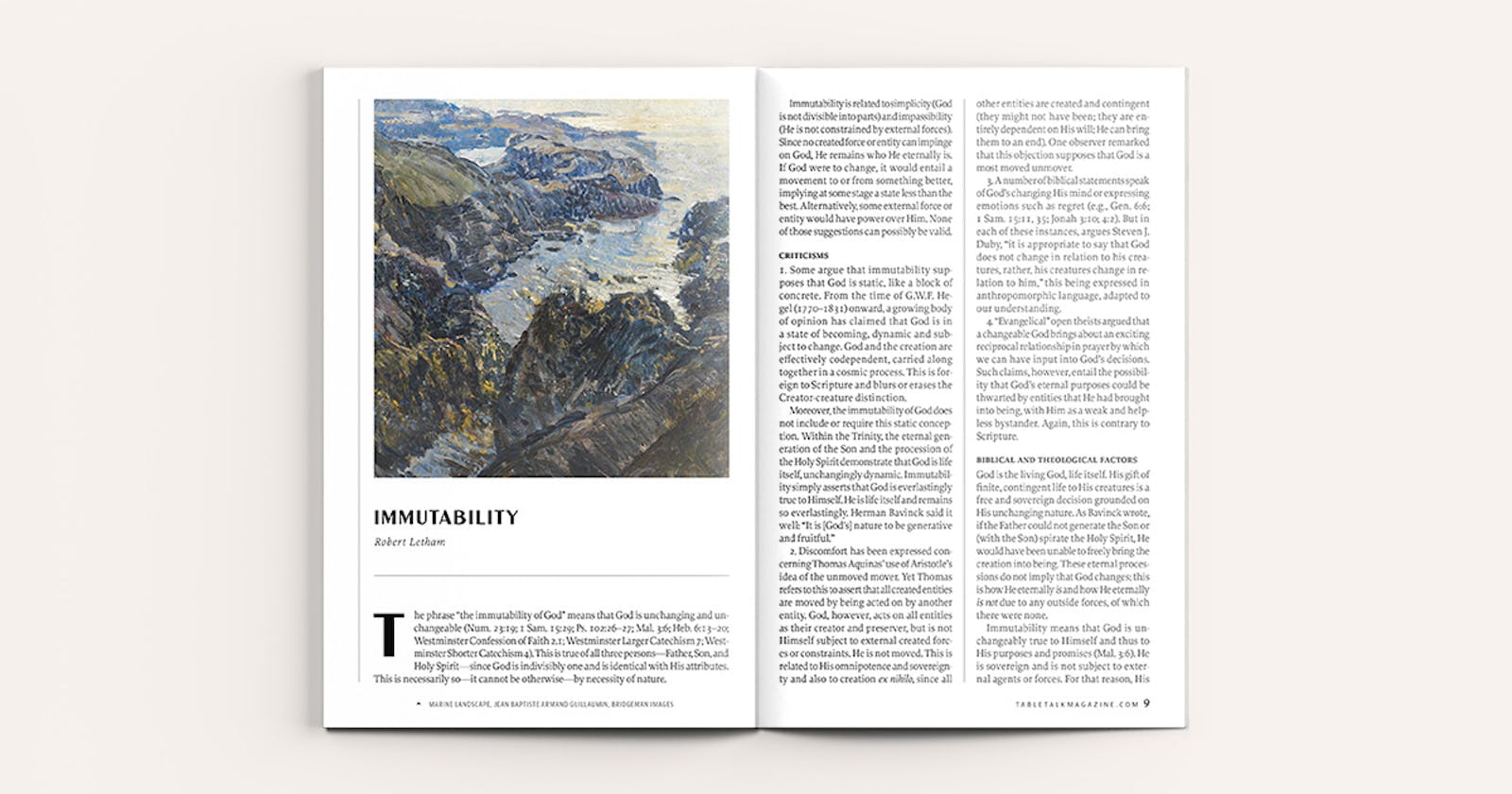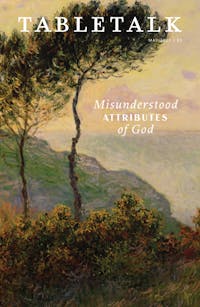
Request your free, three-month trial to Tabletalk magazine. You’ll receive the print issue monthly and gain immediate digital access to decades of archives. This trial is risk-free. No credit card required.
Try Tabletalk NowAlready receive Tabletalk magazine every month?
Verify your email address to gain unlimited access.
The phrase “the immutability of God” means that God is unchanging and unchangeable (Num. 23:19; 1 Sam. 15:29; Ps. 102:26–27; Mal. 3:6; Heb. 6:13–20; Westminster Confession of Faith 2.1; Westminster Larger Catechism 7 Westminster Shorter Catechism 4). This is true of all three persons—Father, Son, and Holy Spirit—since God is indivisibly one and is identical with His attributes. This is necessarily so—it cannot be otherwise—by necessity of nature.
Immutability is related to simplicity (God is not divisible into parts) and impassibility (He is not constrained by external forces). Since no created force or entity can impinge on God, He remains who He eternally is. If God were to change, it would entail a movement to or from something better, implying at some stage a state less than the best. Alternatively, some external force or entity would have power over Him. None of those suggestions can possibly be valid.
criticisms
1. Some argue that immutability supposes that God is static, like a block of concrete. From the time of G.W.F. Hegel (1770–1831) onward, a growing body of opinion has claimed that God is in a state of becoming, dynamic and subject to change. God and the creation are effectively codependent, carried along together in a cosmic process. This is foreign to Scripture and blurs or erases the Creator-creature distinction.
Moreover, the immutability of God does not include or require this static conception. Within the Trinity, the eternal generation of the Son and the procession of the Holy Spirit demonstrate that God is life itself, unchangingly dynamic. Immutability simply asserts that God is everlastingly true to Himself. He is life itself and remains so everlastingly. Herman Bavinck said it well: “It is [God’s] nature to be generative and fruitful.”
2. Discomfort has been expressed concerning Thomas Aquinas’ use of Aristotle’s idea of the unmoved mover. Yet Thomas refers to this to assert that all created entities are moved by being acted on by another entity. God, however, acts on all entities as their creator and preserver, but is not Himself subject to external created forces or constraints. He is not moved. This is related to His omnipotence and sovereignty and also to creation ex nihilo, since all other entities are created and contingent (they might not have been; they are entirely dependent on His will; He can bring them to an end). One observer remarked that this objection supposes that God is a most moved unmover.
3. A number of biblical statements speak of God’s changing His mind or expressing emotions such as regret (e.g., Gen. 6:6; 1 Sam. 15:11, 35; Jonah 3:10; 4:2). But in each of these instances, argues Steven J. Duby, “it is appropriate to say that God does not change in relation to his creatures, rather, his creatures change in relation to him,” this being expressed in anthropomorphic language, adapted to our understanding.
4. “Evangelical” open theists argued that a changeable God brings about an exciting reciprocal relationship in prayer by which we can have input into God’s decisions. Such claims, however, entail the possibility that God’s eternal purposes could be thwarted by entities that He had brought into being, with Him as a weak and helpless bystander. Again, this is contrary to Scripture.
biblical and theological factors
God is the living God, life itself. His gift of finite, contingent life to His creatures is a free and sovereign decision grounded on His unchanging nature. As Bavinck wrote, if the Father could not generate the Son or (with the Son) spirate the Holy Spirit, He would have been unable to freely bring the creation into being. These eternal processions do not imply that God changes; this is how He eternally is and how He eternally is not due to any outside forces, of which there were none.

Immutability means that God is unchangeably true to Himself and thus to His purposes and promises (Mal. 3:6). He is sovereign and is not subject to external agents or forces. For that reason, His character does not and cannot change. This is the foundation for all His external works of creation, providence, and grace. It is the basis for our faith and assurance (Heb. 6:13–20).
Some have suggested that the incarnation was something new for God. It involved the Son, one member of the Trinity, taking to Himself in permanent, everlasting personal union a human nature, which in that act was constituted His human nature. From the historical angle, this was a real event in our own world that happened just over two thousand years ago. Before then, it had not occurred; afterward, it had.
But it was God’s primal decision to become incarnate in Jesus Christ from then and forever, as the foundation of our own election and union with Him (Eph. 1:4). Moreover, in the incarnation, God Himself did not change. The Son did not become man in the sense of changing into man. He did not enhance Himself or add to what He always was and is. That would not be incarnation but metamorphosis. Rather, the Son by taking human nature into permanent union so that it became His human nature (Phil. 2:6–7) became flesh in such a way that He continued, as the Son or Logos, to be the subject of all the experiences of Jesus of Nazareth, while remaining who He ever was and is (John 1:1–4, 14–18; Heb. 13:8), experiencing them as man. From that, the processes of human life in this world, including suffering, death, burial, and resurrection, are known to God from a human perspective. The immutability of God secures this.
implications and entailments
Immutability (together with simplicity and impassibility) is foundational to the whole of theology. It provides the ground for the work of redemption, since God is relentlessly true to His covenant and its promises. It is a vital bulwark for our assurance (Heb. 6:13–20), for “the steadfast love of the Lord is from everlasting to everlasting on those who fear him” (Ps. 103:17).
